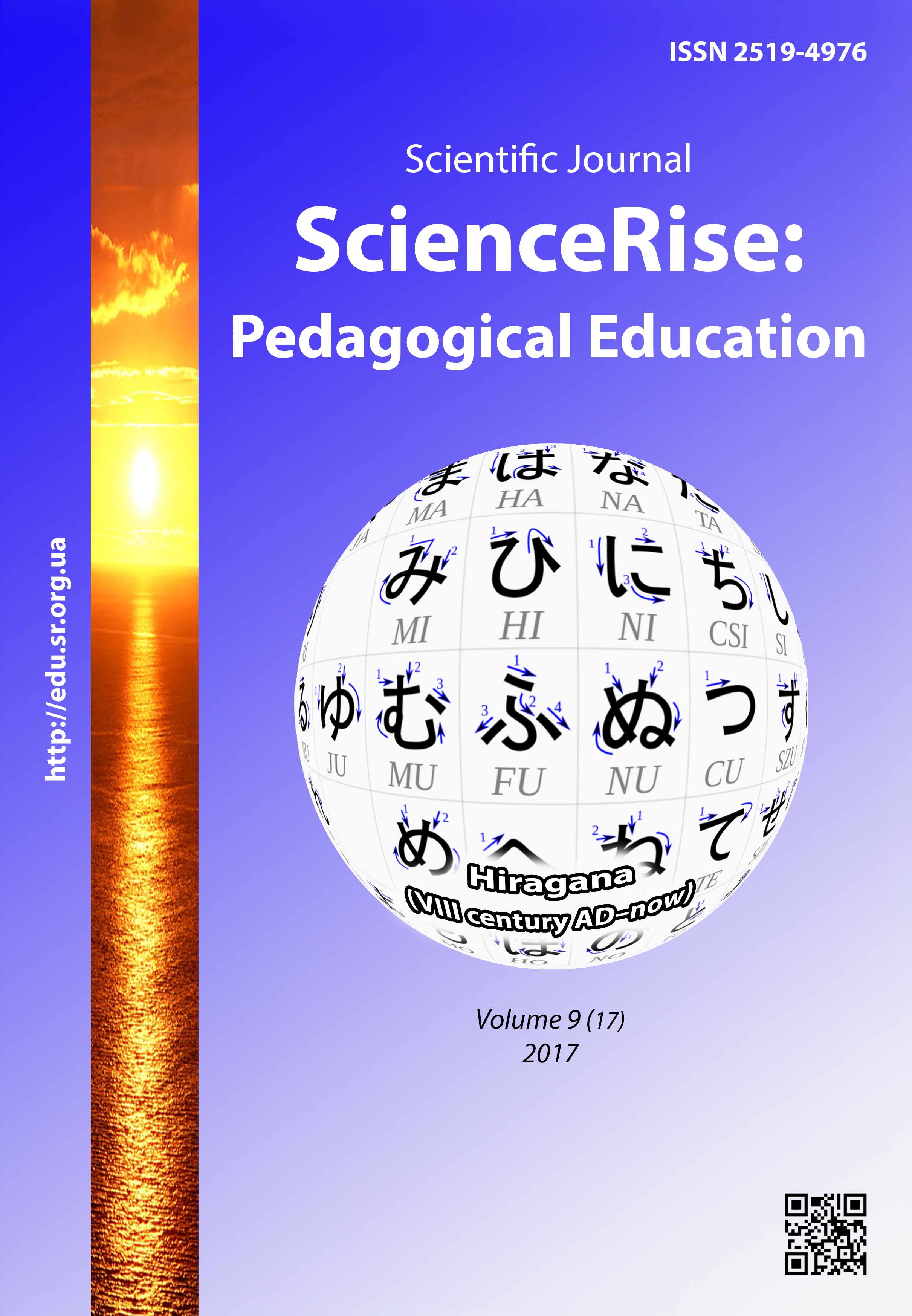Development of the methods of conducting the developing game "QUIZ" for informal education of schoolchildren of middle and senior classes
DOI:
https://doi.org/10.15587/2519-4984.2017.111111Keywords:
informal education, intellectual games, quiz, media materials, team play, leadership skillsAbstract
Intellectual games are a good tool in teaching schoolchildren. Since they allow not only to submit new information in an interesting form, which draws the attention of schoolchildren, it is also used to verify the knowledge that has already been obtained. Various intellectual games are used in various spheres and at different levels of training, in this study the application of the intellectual game "QUIZ" in the framework of informal education of schoolchildren of middle and senior classes is considered.
The aim of the work is development of a new methodology for conducting intellectual games, which will attract the attention of schoolchildren to various aspects of knowledge, as well as diversify the learning process.
In this study, the methodology for conducting the intellectual game QUIZ is developed, various contests that are included in this game, and the methodology for their conduct are described.
Studies of the use of this methodology in practice with the use of developed competitions and media materials are conducted. The advantages and disadvantages of using this training method are analyzed. A survey of schoolchildren is conducted, which revealed the success of this training method
References
- Malkov, D. Yu. (2012). Osoblyvosti orhanizatsii dozvillievoi diialnosti za mistsem prozhyvannia. Aktualni pytannia kulturolohii, 12, 223–227.
- Abil'dinova, Zh. B. (2015). Formy i metody ispol'zovaniya stranovedcheskogo materiala na urokakh angliyskogo yazyka. Sotsial'no-ekonomicheskie i tekhnicheskie sistemy: issledovanie, proektirovanie, optimizatsiya, 1 (4 (67)), 133–140.
- Vovk, O. V. (2009). Osnovni zavdannia ukrainskoi dytiachoi literatury (rozdumy nad problemoiu). Aktualni problemy slovianskoi filolohii. Vyp. XX: Linhvistyka i literaturoznavstvo. Donetsk: TOV “Yuho-Vostok, Ltd”, 241–249.
- Petruk, V. A., Prozor, O. P. (2010). Intelektualni ihry yak zasib formuvannia zdatnosti do aktyvnoi diialnosti studentiv VNZ. Visnyk Cherkaskoho universytetu. Seriia: Pedahohichni nuky, 189 (1), 45–49.
- Sіchko, І. (2013). Ekologіchna kompetentnіst' yak profesіyna skladova pіdgotovki maybutnіkh vchitelіv pochatkovikh klasіv. Problemi pіdgotovki suchasnogo vchitelya, 7, 205–209.
- Rotan, N. V. (2013). Zastosuvannia innovatsiinykh metodiv navchannia pry provedenni seminarskykh zaniat vykladachamy spetsialnykh dystsyplin na spetsialnosti «bukhhalterskyi oblik». Aktualni problemy nauky ta osvity: teoriia, praktyka, suchasni rishennia, 3 (4), 199–203.
- Barr, M. (2017). Video games can develop graduate skills in higher education students: A randomised trial. Computers and Education, 113, 86–97. doi: 10.1016/j.compedu.2017.05.016
- Smith, S., Chan, S. (2017). Collaborative and competitive video games for teaching computing in higher education. Journal of Science Education and Technology, 26 (4), 438–457. doi: 10.1007/s10956-017-9690-4
- Nation-Grainger, S. (2017). ‘It’s just PE’ till ‘It felt like a computer game’: Using technology to improve motivation in physical education. Research Papers in Education, 32 (4), 463–480. doi: 10.1080/02671522.2017.1319590
- Kordaki, M., Gousiou, A. (2017). Digital card games in education: A ten year systematic review. Computers and Education, 109, 122–161. doi: 10.1016/j.compedu.2017.02.011
- Zakaria, G. A. N., Mahalle, S., Hashim, D. N. P., Mohd Nawi, M. A. (2014). Increasing student mastery and achievement in islamic education through game techniques, memory aid 'the link' and mind maps. Research Journal of Applied Sciences, Engineering and Technology, 7 (15), 3203–3208.
- Sharada (zagadka). Wikipedia. Available at: https://ru.wikipedia.org/wiki/Шарада_(загадка)
- Intellektual'naya igra «Pentagon» (6–11 klassy). Intellektual'nyy klub "Kontakt". Available at: http://www.klubkontakt.net/publ/6-1-0-455
- Intellektual'naya igra «Pentagon» (6–11 klassy) (2015). Intellektual'nyi klub "Kontakt". Available at: http://www.kkzu.org.ua/sostoyalsya-fynal-shkolnoho-chempyonata-harkova-po-chto-hde-kohda/
- V Odesse proshli krupneyshie v Ukraine sorevnovaniya po intellektual'nym igram dlya shkol'nikov (2017). Mayak. Available at: http://mayak.org.ua/news/were-held-in-odessa-ukraines-largest-competitions-on-intellectual-games-for-schoolchildren/
Downloads
Published
How to Cite
Issue
Section
License
Copyright (c) 2017 Алина Викторовна Макаренко

This work is licensed under a Creative Commons Attribution 4.0 International License.
Our journal abides by the Creative Commons CC BY copyright rights and permissions for open access journals.
Authors, who are published in this journal, agree to the following conditions:
1. The authors reserve the right to authorship of the work and pass the first publication right of this work to the journal under the terms of a Creative Commons CC BY, which allows others to freely distribute the published research with the obligatory reference to the authors of the original work and the first publication of the work in this journal.
2. The authors have the right to conclude separate supplement agreements that relate to non-exclusive work distribution in the form in which it has been published by the journal (for example, to upload the work to the online storage of the journal or publish it as part of a monograph), provided that the reference to the first publication of the work in this journal is included.







